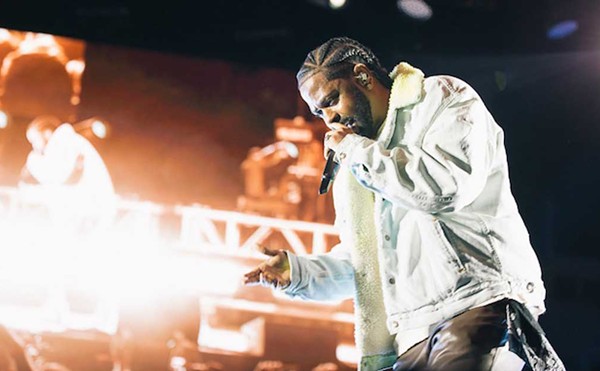It’s rehearsal night at Thrilla Park, the new studio for the Detroit genre-crunchers Blue Dog. The freshly painted cinder block walls disguise the fact that, mere weeks ago, this was an oily, industrial workspace. Now it’s well on its way to becoming a musical laboratory. Along with performance poet Rico Africa and sample manipulator Jamie Townsend, Blue Dog lays down a heavy funk vamp. As Africa releases a funkenstein of a rant, and electronic beats bounce around the room, the group alternates its riffing with startling bursts of free jazz energy. On the wall behind pianist Mick Dobday hangs the obligatory sign: Beware of the dog.
Like any other canine of a different color, Blue Dog is its own animal. This group of musical reinventors has now reinvented itself – with a healthy strain of DIY attitude to boot. Thrilla Park and Cobalt 61, the band’s new label, promises an outpouring of records, beginning with a long-awaited second CD, Lurch. Meanwhile, Blue Dog is embarking on a diverse set of shows at Detroit’s Gold Dollar. On "almost every Thursday" this month, Blue Dog will present its new, old and reinvented sounds: jazz-funk cut-ups, exotica excursions, darkly humorous tangos, even an electronic deconstruction of their epic "Western Suite." Plus, there will be appearances by friends of the band who have helped to create its postmodern bricolage sound. Expect appearances by such ace musicians as erstwhile Blue Dog bassist Jaribu Shahid and early guitarist George Friend of Black Beauty.
In the beginning, Blue Dog mixed and matched charts of Zep’s "Black Dog" and Monk’s "Blue Monk," arriving at a name, a theme song, and a modus operandi. But this Dog’s sound is much more than the sum of its barks – it’s how the members do their crafty addition. Not surprisingly, the group respects the avant-garde collage aesthetics of John Zorn.
As Dobday explains the workings of Blue Dog, "It’s like saying, ‘We grew up in this time. This is how we do things.’ This isn’t the ’50s or ’60s. Now, it’s a combination of all of these things. It’s like DJ Shadow, or Zorn, taking all of these different elements and mixing them together. We’re deluged with all of these different elements all the time, from TV, film, the radio, sounds from outside. In normal life, all of these things live together. It all works."
In Blue Dog’s music, it all works, too. The group has a knack for real-time genre juxtapositions, especially in its extended suites. The film noir-spy jazz epic "Draggin’ the Lake," from Lurch, swings like Mingus walking down Sunset Boulevard, even as it detours into surf, metal and other lands. "There’s certain clues in a film soundtrack that can tell a story musically," Dobday tells. "It’s fun to take some of those and distort them, or take those elements, but tell your story a different way." Though Dobday contributes the initial charts, the Blue Dog ethos almost requires that all the members have their chance to deconstruct and reinvent the material.
Detroit figures prominently in Blue Dog’s equations as well. There’s a downtown sophistication in the sound, but for any given avant-garde element there are also street-level counterparts: dope funk, electric jazz, homages to Detroit’s rock legacy. In fact, Lurch kicks off with "Iguana," wherein guitarist Eric Gustafson’s primeval Iggy riffs meet saxophonist Michael Graye’s smooth sax.
After these kindred spirits and former Wayne State music students hooked up a decade ago, they forged their working relationship in a trial by fire. Gigging every Saturday at the Red Door, the legendary (and now defunct) WSU-area after-hours club, Blue Dog presented adventurous entertainment in those arduous wee small hours. Says Graye, "We’d be coming off of a four-hour gig, together or separately and then we’d be at the Red Door at 2:30 a.m."
"And we’d be packing up while the sun was coming up," drummer Alex Trajano continues.
Such hard gigging has paid off artistically. But can it pay off economically? Like other artists precariously balancing the avant-garde and the commercial, the Blue Dog folks have a sensitivity to, as they say in the industry, the harsh economic realities. As Trajano concludes, "We know that we’re not going to be buying new houses off of what we love to do. But as long as we’re able to keep creating the type of stuff that we want to create, at our pace, in the way that we want to, I’ll be very happy. I just want to follow the path that’s in our hearts."
Metro Times music hound Greg Baise wants a dog, but he’d prefer it to be green. E-mail comments to [email protected]




